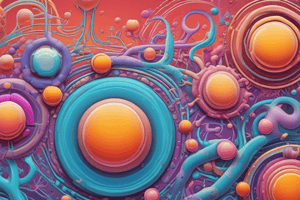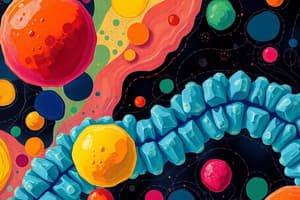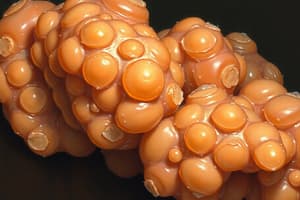Podcast
Questions and Answers
What is the primary function of chylomicrons in the body?
What is the primary function of chylomicrons in the body?
- Conversion of glucose into fatty acids
- Synthesis of bile acids in the liver
- Transport of dietary lipids into the blood circulation (correct)
- Storage of lipids in adipose tissue
Where are long-chain fatty acids processed to form triacylglycerol in enterocytes?
Where are long-chain fatty acids processed to form triacylglycerol in enterocytes?
- Mitochondria
- Lysosome
- Golgi apparatus
- Smooth endoplasmic reticulum (correct)
Which apolipoprotein is synthesized first during the formation of chylomicrons?
Which apolipoprotein is synthesized first during the formation of chylomicrons?
- Apo B100
- Apo A
- Apo B48 (correct)
- Apo C
What role do mixed micelles play in lipid absorption?
What role do mixed micelles play in lipid absorption?
In which system are chylomicrons initially formed after lipid digestion?
In which system are chylomicrons initially formed after lipid digestion?
What happens to chylomicrons after being released from enterocytes?
What happens to chylomicrons after being released from enterocytes?
What is a clinical manifestation of abetalipoproteinemia?
What is a clinical manifestation of abetalipoproteinemia?
What is the primary defect in Familial type III hyperlipoproteinemia?
What is the primary defect in Familial type III hyperlipoproteinemia?
Which condition is primarily associated with Familial Hypertriacylglycerolemia?
Which condition is primarily associated with Familial Hypertriacylglycerolemia?
Which process occurs in the smooth endoplasmic reticulum during lipid metabolism?
Which process occurs in the smooth endoplasmic reticulum during lipid metabolism?
What is the main characteristic of atherosclerosis?
What is the main characteristic of atherosclerosis?
What is one of the consequences of hepatic lipase deficiency?
What is one of the consequences of hepatic lipase deficiency?
What describes the lipid profile associated with high risk for atherosclerosis?
What describes the lipid profile associated with high risk for atherosclerosis?
Which lipoprotein is primarily responsible for transporting cholesterol to peripheral cells?
Which lipoprotein is primarily responsible for transporting cholesterol to peripheral cells?
What is the main function of HDL in relation to cholesterol?
What is the main function of HDL in relation to cholesterol?
In familial hypercholesterolemia, which receptor is primarily defective?
In familial hypercholesterolemia, which receptor is primarily defective?
What transports dietary lipids in the body?
What transports dietary lipids in the body?
Which apolipoproteins are synthesized in the liver and transferred to HDL?
Which apolipoproteins are synthesized in the liver and transferred to HDL?
How does HDL prevent thrombus formation?
How does HDL prevent thrombus formation?
What characterizes hyperlipoproteinemia?
What characterizes hyperlipoproteinemia?
Which lipoprotein is involved in receptor-mediated endocytosis of cholesterol?
Which lipoprotein is involved in receptor-mediated endocytosis of cholesterol?
What is the primary structural component of VLDL and chylomicrons?
What is the primary structural component of VLDL and chylomicrons?
Which apo protein acts as a cofactor for lipoprotein lipase?
Which apo protein acts as a cofactor for lipoprotein lipase?
Which process describes the catabolism of VLDL?
Which process describes the catabolism of VLDL?
Which apo protein is essential for the formation of VLDL?
Which apo protein is essential for the formation of VLDL?
What do the remnants of VLDL form in humans?
What do the remnants of VLDL form in humans?
Which receptor does apo B-100 primarily interact with?
Which receptor does apo B-100 primarily interact with?
Which of the following statements about the metabolism of lipoproteins is true?
Which of the following statements about the metabolism of lipoproteins is true?
During VLDL metabolism, what is the main result of hydrolysis by lipoprotein lipase?
During VLDL metabolism, what is the main result of hydrolysis by lipoprotein lipase?
What is the primary mechanism by which chylomicrons are released from the cell?
What is the primary mechanism by which chylomicrons are released from the cell?
What happens to approximately 90% of the triacylglycerol in chylomicrons?
What happens to approximately 90% of the triacylglycerol in chylomicrons?
What characterizes chylomicron remnants after the catabolism of chylomicrons?
What characterizes chylomicron remnants after the catabolism of chylomicrons?
Which enzyme facilitates the uptake of chylomicron remnants by the liver?
Which enzyme facilitates the uptake of chylomicron remnants by the liver?
Based on density, which of the following lipoproteins has the lowest density?
Based on density, which of the following lipoproteins has the lowest density?
Which apolipoprotein is predominant in Chylomicrons?
Which apolipoprotein is predominant in Chylomicrons?
What is the major component of the nonpolar lipid core of lipoproteins?
What is the major component of the nonpolar lipid core of lipoproteins?
Which type of lipoproteins is characterized by having a higher density than LDL?
Which type of lipoproteins is characterized by having a higher density than LDL?
What type of disorder results from inherited defects in lipoprotein metabolism?
What type of disorder results from inherited defects in lipoprotein metabolism?
Which of the following conditions is NOT a secondary disorder that can cause alterations in lipoproteins?
Which of the following conditions is NOT a secondary disorder that can cause alterations in lipoproteins?
What is a characteristic of Tangier disease?
What is a characteristic of Tangier disease?
Familial lipoprotein lipase deficiency leads to which of the following conditions?
Familial lipoprotein lipase deficiency leads to which of the following conditions?
Which of the following is a defect associated with familial alpha-lipoprotein deficiency?
Which of the following is a defect associated with familial alpha-lipoprotein deficiency?
What is the main consequence of a defective LDL receptor in familial hypercholesterolemia?
What is the main consequence of a defective LDL receptor in familial hypercholesterolemia?
In which disorder are chylomicrons and VLDL not cleared effectively due to LPL deficiency?
In which disorder are chylomicrons and VLDL not cleared effectively due to LPL deficiency?
Which of the following best describes hyperlipoproteinemia associated with familial hypercholesterolemia?
Which of the following best describes hyperlipoproteinemia associated with familial hypercholesterolemia?
Flashcards
What are lipoproteins?
What are lipoproteins?
Lipoproteins are particles composed of lipids and proteins responsible for transporting lipids throughout the body.
What is the exogenous pathway?
What is the exogenous pathway?
Exogenous pathway focuses on the absorption of dietary fats. It involves the transport of lipids from the intestine to the liver and tissues.
What is the endogenous pathway?
What is the endogenous pathway?
Endogenous pathway focuses on the synthesis and transport of lipids within the body. It involves the synthesis and transport of lipids from the liver to other tissues.
What are chylomicrons?
What are chylomicrons?
Signup and view all the flashcards
What are VLDL and LDL?
What are VLDL and LDL?
Signup and view all the flashcards
What are HDLs?
What are HDLs?
Signup and view all the flashcards
What is Apolipoprotein B?
What is Apolipoprotein B?
Signup and view all the flashcards
What is Abetalipoproteinemia?
What is Abetalipoproteinemia?
Signup and view all the flashcards
Chylomicrons: What are they?
Chylomicrons: What are they?
Signup and view all the flashcards
How are chylomicrons transported?
How are chylomicrons transported?
Signup and view all the flashcards
What enzyme breaks down chylomicrons?
What enzyme breaks down chylomicrons?
Signup and view all the flashcards
What happens to chylomicron remnants?
What happens to chylomicron remnants?
Signup and view all the flashcards
How are lipoproteins classified?
How are lipoproteins classified?
Signup and view all the flashcards
What is another way to classify lipoproteins?
What is another way to classify lipoproteins?
Signup and view all the flashcards
What is the role of apo B in lipoproteins?
What is the role of apo B in lipoproteins?
Signup and view all the flashcards
What is the function of apo C-II?
What is the function of apo C-II?
Signup and view all the flashcards
What is the function of apo A-I?
What is the function of apo A-I?
Signup and view all the flashcards
How do apo B-100 and apo E interact with cells?
How do apo B-100 and apo E interact with cells?
Signup and view all the flashcards
What is VLDL?
What is VLDL?
Signup and view all the flashcards
What is LDL?
What is LDL?
Signup and view all the flashcards
What is HDL?
What is HDL?
Signup and view all the flashcards
What is lipoprotein lipase?
What is lipoprotein lipase?
Signup and view all the flashcards
Familial Hypercholesterolemia
Familial Hypercholesterolemia
Signup and view all the flashcards
Reverse Cholesterol Transport
Reverse Cholesterol Transport
Signup and view all the flashcards
HDL (High-Density Lipoprotein)
HDL (High-Density Lipoprotein)
Signup and view all the flashcards
LDL (Low-Density Lipoprotein)
LDL (Low-Density Lipoprotein)
Signup and view all the flashcards
HDL Synthesis
HDL Synthesis
Signup and view all the flashcards
Hyperlipoproteinemia
Hyperlipoproteinemia
Signup and view all the flashcards
Hyperlipidemia
Hyperlipidemia
Signup and view all the flashcards
Chylomicrons
Chylomicrons
Signup and view all the flashcards
Familial type III hyperlipoproteinemia
Familial type III hyperlipoproteinemia
Signup and view all the flashcards
What are the characteristics of familial type III hyperlipoproteinemia?
What are the characteristics of familial type III hyperlipoproteinemia?
Signup and view all the flashcards
Familial Hypertriacylglycerolemia (type IV)
Familial Hypertriacylglycerolemia (type IV)
Signup and view all the flashcards
What are the characteristics of Familial Hypertriacylglycerolemia (type IV)?
What are the characteristics of Familial Hypertriacylglycerolemia (type IV)?
Signup and view all the flashcards
Hepatic lipase deficiency
Hepatic lipase deficiency
Signup and view all the flashcards
Primary Dyslipoproteinemias
Primary Dyslipoproteinemias
Signup and view all the flashcards
Secondary Dyslipoproteinemias
Secondary Dyslipoproteinemias
Signup and view all the flashcards
Abetalipoproteinemia
Abetalipoproteinemia
Signup and view all the flashcards
Familial alpha-lipoprotein deficiency
Familial alpha-lipoprotein deficiency
Signup and view all the flashcards
Familial Hypercholesterolemia (type IIa)
Familial Hypercholesterolemia (type IIa)
Signup and view all the flashcards
Familial Lipoprotein Lipase Deficiency (type I)
Familial Lipoprotein Lipase Deficiency (type I)
Signup and view all the flashcards
Familial Lipoprotein Lipase Deficiency
Familial Lipoprotein Lipase Deficiency
Signup and view all the flashcards
Abetalipoproteinemia
Abetalipoproteinemia
Signup and view all the flashcards
Study Notes
Lipoprotein Metabolism
- Lipoproteins are complexes of lipids and proteins
- They transport lipids throughout the body
- Triglycerides, phospholipids, cholesterol (free and bound), and protein are components
Lipoprotein Classification
- Lipoproteins are categorized based on density
- Types of lipoproteins include chylomicrons, VLDL, IDL, LDL, and HDL
Chylomicron Metabolism
- Chylomicrons transport dietary lipids from the intestines
- Synthesis includes apo B48 and apo B100
- Lipoprotein lipase breaks down triglycerides within the chylomicrons, releasing fatty acids
- Chylomicron remnants are taken up by the liver through receptor-mediated endocytosis
- The liver metabolizes cholesterol and triacylglycerols in the remnants
VLDL Metabolism
- VLDLs transport endogenous lipids (triacylglycerols) from the liver to tissues
- They are synthesized in the liver
- Lipoprotein lipase plays a crucial role in breaking down triglycerides in VLDL
- VLDL remnants (IDL) are partly metabolized by the liver and partly transformed to LDL
LDL Metabolism
- LDL transports cholesterol from the liver to peripheral tissues
- The liver and extrahepatic tissues express LDL receptors that take up LDL via receptor-mediated endocytosis
- Approximately 30% of LDL is degraded in extrahepatic tissues, and 70% in the liver
- Plasma LDL cholesterol is linked to coronary atherosclerosis
HDL Metabolism
- HDL participates in reverse cholesterol transport, removing excess cholesterol from peripheral tissues and transporting it to the liver
- HDL is synthesized in the liver and intestines
- HDL particles facilitate the movement of cholesteryl esters into the liver via receptor-mediated endocytosis
Apolipoproteins (Apo)
- Apoproteins are proteins associated with lipoproteins
- They have structural roles, act as cofactors for enzymes, and as ligands for lipoprotein receptors
Fatty Liver Disease
- Fatty liver disease occurs when lipids accumulate in the liver
- Blood indicators (total lipids, triglycerides, cholesterol, phospholipids) may be elevated
Lipid Absorption
- Short-chain and medium-chain fatty acids are absorbed directly by the portal vein into the liver
- Long-chain fatty acids are absorbed with bile salts to form micelles into the mucosal cells
Hyperlipidemia
- Elevated plasma cholesterol or triglyceride levels or both indicate hyperlipidemia (hyperlipoproteinemia)
Atherosclerosis
- A condition involving the buildup of lipids, cholesterol, calcium, and cellular debris within the walls of arteries (intima).
- The accumulation leads to a narrowing of the arteries, which potentially restricts blood flow
- Accumulation of cholesterol in artery intima is a primary step in atherosclerosis.
- Monocytes enter the affected areas and cholesterol is endocytosed into these blood cells
- This process leads to damage of endothelium and foam cell formation
Primary and Secondary Disorders of Lipoprotein Metabolism
- Primary disorders are from genetic mutations impacting lipoproteins' transport or formation
- Secondary disorders result from other systemic issues (e.g., pregnancy, hypothyroidism, or diabetes)
Lipoproteins Disorder Classification Table
- Provides detailed characteristics and defect information for various lipoprotein disorders (e.g., abetalipoproteinemia, familial hypercholesterolemia, familial lipoprotein lipase deficiency).
Studying That Suits You
Use AI to generate personalized quizzes and flashcards to suit your learning preferences.




